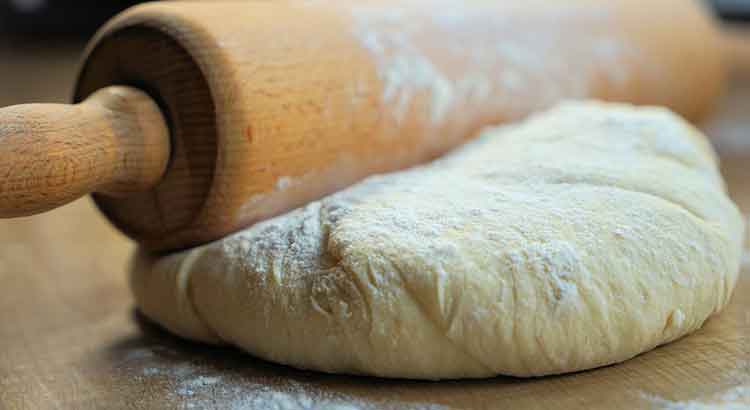Do you love making pizza at home but wonder if using pizza dough or sourdough is the way to go?
The main difference between pizza dough and sourdough lies in their ingredients and preparation. Pizza dough is typically a straightforward mixture of flour, water, yeast, salt, and sometimes olive oil. Sourdough, on the other hand, is a naturally leavened bread made with a sourdough starter, which is a fermented mixture of flour and water.
From the crusty edges to the toppings you love, the choice between pizza dough and sourdough can significantly affect your homemade pizza experience. In this article, we’ll delve into the differences and similarities between these two popular pizza bases. Whether you’re a pizza enthusiast or a sourdough aficionado, understanding these distinctions will elevate your culinary expertise. So stay tuned as we explore the secrets that make each pizza slice unique!
Pizza Dough vs. Sourdough: What Sets Them Apart?
Ingredients and Preparation
Pizza dough and sourdough start with different building blocks. Pizza dough is a simple mix of flour, water, yeast, salt, and sometimes a dash of olive oil. It’s a straightforward process that yields a soft and pliable dough perfect for pizza. Sourdough, on the other hand, revolves around its unique sourdough starter—a fermented blend of flour and water. This starter introduces natural wild yeast and lactic acid bacteria into the dough, giving sourdough its distinctive tangy flavor and chewy texture.
Rising Time
One significant difference between these two doughs is the rising time. Pizza dough tends to rise relatively quickly, typically in an hour or two, thanks to the commercial yeast. This shorter rise results in a dough that’s easier to work with when you’re in a hurry to satisfy your pizza craving. Sourdough, however, is known for its longer fermentation process. It can take anywhere from 12 to 24 hours or even more, depending on factors like temperature and starter strength. The extended rise not only develops that signature sourdough flavor but also enhances its digestibility.
Flavor Profiles
Here’s where the contrast truly shines: flavor. Pizza dough has a milder, neutral taste, allowing the toppings and sauce to take center stage. It serves as the canvas for your favorite pizza creations, offering a simple, dependable foundation. In contrast, sourdough brings a robust, tangy, and slightly nutty flavor to the table. Its distinct taste can either complement your pizza toppings or stand out as a unique element in its own right. The longer fermentation process and wild yeast contribute to the complex flavor profile that sourdough enthusiasts adore.
Texture and Crust
When it comes to texture, the doughs diverge. Pizza dough yields a thin, crispy crust with a tender interior, perfect for those who love a classic pizza slice with a delightful crunch. Sourdough, however, offers a chewier and denser crust with an airy, hole-riddled interior. This texture variation is a result of the wild yeast’s slow fermentation and the unique structure of sourdough bread. It’s an acquired taste that many sourdough fans find irresistible.
Versatility
While pizza dough may be the go-to choice for pizza, it’s not just limited to that. You can use pizza dough for various recipes like calzones, stromboli, or even cinnamon rolls. Its neutrality makes it a versatile option in the kitchen. Sourdough, on the other hand, is primarily used for bread but can be adapted for pizza making. The sourdough crust adds a unique twist to your pizza experience, making it a treat for those looking for something different.
The Similarities You Might Not Expect
Fermentation
Both pizza dough and sourdough rely on fermentation to create their unique characteristics. Fermentation is like a culinary magic trick that transforms dough into deliciousness. Pizza dough achieves this with the help of commercial yeast, which acts quickly to raise the dough in just a couple of hours. Sourdough, on the other hand, takes its time, relying on wild yeast and lactic acid bacteria. This natural fermentation process can stretch over a day or more, resulting in that distinctive tangy flavor.
Versatility in Toppings
One delightful similarity between these two doughs is their ability to play host to a wide range of toppings. Whether you go for pizza dough or sourdough, your creative options are virtually limitless. From classic combinations like pepperoni and mozzarella to adventurous choices like goat cheese and arugula, both doughs can handle it. So, load up your pizza with your favorite ingredients and let your culinary imagination run wild.
The Joy of Homemade
Making pizza from scratch is a universal joy that transcends the choice of dough. Kneading, shaping, and topping your dough is a rewarding experience that brings the kitchen to life with enticing aromas. Whether you’re a fan of pizza dough’s simplicity or sourdough’s complexity, the satisfaction of crafting your own pizza remains unchanged. There’s something profoundly gratifying about that first bite into a homemade slice, knowing you put in the effort to create something delicious.
Final Thoughts
As we wrap up our exploration of pizza dough and sourdough, it’s clear that both have their merits and unique qualities. The choice between the two ultimately depends on your preferences and the experience you seek in your homemade pizza endeavors. Pizza dough offers simplicity, speed, and a canvas for endless topping possibilities. Its quick rise time allows for spontaneous pizza nights and crispy crusts that delight with each bite. On the other hand, sourdough brings complexity, depth of flavor, and a slower, more patient approach to baking. Its tangy, chewy crust and distinctive taste have won the hearts of many bread enthusiasts.
But perhaps the beauty of this comparison lies in the freedom it offers. You can experiment, combine, and adapt these doughs to suit your culinary whims. Why not try a sourdough-style pizza with your favorite toppings or add a touch of sourdough flavor to your classic pizza dough? The kitchen is your playground, and pizza-making is an art that allows you to express your creativity and satisfy your taste buds.
In the end, pizza dough and sourdough share more similarities than differences when it comes to the joy of creating homemade delights. Both offer a fulfilling and rewarding experience that transcends the outcome on your plate. So, whether you choose the simplicity of pizza dough or the complexity of sourdough, relish the journey, enjoy the flavors, and share your delicious creations with friends and family. After all, the heart of baking is not just in the dough but in the shared moments and the smiles around the table. Happy baking!
Frequently Asked Questions
Can I Use Pizza Dough for Sourdough Bread or Vice Versa?
Absolutely! While pizza dough and sourdough have their unique characteristics, there’s no strict rule against experimenting. You can use pizza dough to make sourdough-style pizza or even shape it into a rustic loaf for a simpler bread. Conversely, you can employ sourdough starter to make a sourdough-style pizza with its distinctive flavor profile. Don’t be afraid to cross the dough boundaries and discover your own culinary innovations.
Why Does Sourdough Take So Much Longer to Rise?
Sourdough’s extended rise time is primarily due to its reliance on natural fermentation. Unlike pizza dough, which uses commercial yeast for a quick boost, sourdough uses wild yeast and lactic acid bacteria. These microorganisms work at a slower pace, resulting in a longer fermentation process. Additionally, the acidity produced during sourdough fermentation contributes to its unique flavor and texture but requires more time to develop fully.
Can I Make Sourdough Pizza Crust Without a Sourdough Starter?
If you’re in the mood for a sourdough-flavored pizza but don’t have a sourdough starter on hand, there’s a workaround. You can create a sourdough-like crust by incorporating ingredients that mimic the tangy taste. Try mixing a small amount of yogurt or buttermilk into your pizza dough recipe to introduce some acidity. While it won’t replicate the full complexity of sourdough, it will add a pleasant tang to your pizza crust.
Why Does My Pizza Dough Sometimes Turn Out Tough?
A common issue with pizza dough is toughness, which can result from overmixing or over-kneading the dough. Overworking the dough leads to excess gluten development, making it tough and less enjoyable. To avoid this, handle your pizza dough gently, kneading it just enough to bring it together. Letting the dough rest before shaping and topping can also help relax the gluten and yield a softer crust.
Can I Freeze Pizza Dough or Sourdough Starter?
Yes, you can freeze both pizza dough and sourdough starter. Freezing pizza dough is an excellent way to preserve it for future use. Simply divide your dough into individual portions, wrap them tightly in plastic wrap, and place them in a freezer-safe bag. When you’re ready to use it, thaw the dough in the refrigerator overnight. Sourdough starter can also be frozen in small portions and revived when needed. Just make sure it’s well-sealed to prevent freezer burn.
Which Dough Is Better for a Crispy Crust?
If you’re aiming for a crispy pizza crust, pizza dough is the way to go. Its simplicity and quick rise time contribute to a crust that’s thin and crisp, perfect for achieving that satisfying crunch. While sourdough can also yield a crispy crust, it tends to be thicker and chewier due to its longer fermentation process. So, if a crunchy crust is your goal, pizza dough is the clear winner.

